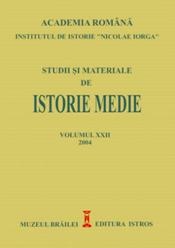Moldova şi Hanatul din Crimeea. 1484-1492
Moldavia and the Crimean Khanate. 1484-1492
Author(s): Nagy PienaruSubject(s): History
Published by: Institutul de Istorie Nicolae Iorga
Summary/Abstract: An analys is made of relations between Stephen the Great and Mengli Giray, evolving from confrontation to cooperation. In order the release the pressure exerted simultaneously on the southern and eastern borders by the Ottoman sultan and the khan of Crimeea, the Moldavian voivode settled an agreement with the Leads of the Golden Horde, the traditional enemie of the Crimean Khanate. With the failure of the surprise attack directed by Murtaza, khan of the Tatars from Volga valley, in Crimeea, Stephen the Great changes his attitudes toward Ottomans and their Tatar’s partners from the north of Black Sea. After the signing of the Moldavian-Ottoman treaty (spring 1486), Stephen the Great and Mengli Giray acted together against the Polish-Lithuanian Kingdom, the Moldavian voivode with his eyes on Pocutia, and the Crimean Khan with a view to securing supremacy over Kiev (Mankerman). In order for these northern goals to be achived, Stephen the Great would sign in 1492 a treaty with Mengli Giray. "În vara anului 1484 hanul Mengli Giray (1468-1475; 1478-1515) a răspuns solicitării lui Bayezid II (1481-1512) şi a organizat o expediţie de pradă în hotarele Moldovei. Măsura preconizată de suveranul din Istanbul urma să faciliteze îndeplinirea obiectivului campaniei otomane de capturare a fortăreţelor maritime Chilia şi Cetatea Albă/Ak Kerman. Din motive pe care nu le cunoaştem, conjuncţia trupelor tătare cu cele otomane s-a produs tardiv, după ce otomanii reuşiseră"[...]
Journal: Studii şi Materiale de Istorie Medie (SMIM)
- Issue Year: 2004
- Issue No: XXII
- Page Count: 8
- Language: Romanian
- Content File-PDF

